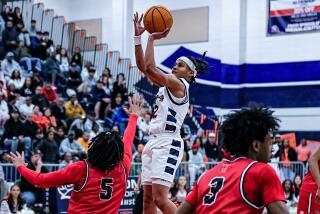Offense Is His Bermuda Triangle
- Share via
Samaki Walker saw the view from the other side last season, sitting on the San Antonio Spurs’ bench when the Lakers blasted them out of the Western Conference finals in a four-game sweep. Actually it was more like fore-gone; in other words, the outcome of the two games in Los Angeles was a foregone conclusion after the Lakers won the first two games in San Antonio.
“You could read it in their faces,” Walker said of the Spurs. “‘OK, let’s go ahead and get it over with.’”
After leaving the Spurs as a free agent and signing a two-year, $2.94-million contract with the Lakers last summer, Walker quickly learned the Laker attitude: “Expect to win,” Walker said. “No matter how many points we’re down, expect to win.”
Now comes the hard part of Samaki’s switch: guarding San Antonio power forward Tim Duncan. Walker is back in San Antonio with the Lakers today in a big Western Conference game. The matchup is less appealing because Shaquille O’Neal is serving the final game of his three-game suspension for throwing a punch at Chicago’s Brad Miller a week ago. And it makes Walker’s task even more difficult, since he’ll probably get a heavy dose of Spur center David Robinson in addition to Duncan.
From his days in practice, he knows you have to make Duncan try to beat you off the dribble instead of simply turning and shooting. He knows Duncan likes to spin toward the middle. And he knows that, come playoff time, it’s going to be Duncan or Chris Webber or Kevin Garnett or some all-star lined up against him at power forward.
The Lakers won the first two championships of the 2000s with A.C. Green and Horace Grant--power forwards who peaked in the 1980s and 1990s, respectively. Now they have a player with upside--although six seasons into his career, he’s reaching the point where upside needs to be converted into results.
On a Laker team that’s all about winning now, the coaching staff still talks about Walker in terms of his potential.
“He can continue to grow in a system where, obviously, he’s not a dominant player,” assistant coach Jim Cleamons said. “He can come in and be a role player. As his role grows, I think his skills will also improve.
“If he’s patient with himself, if he continues to work hard every day, he’s going to have a good career.”
Walker enjoys the most success when he takes advantage of his athleticism and his 6-foot-9 frame. He blocks shots, grabs rebounds and dunks on people when O’Neal and Kobe Bryant pass him the ball.
It’s working the triangle offense that gives him the most problems. An example from a recent game in Minnesota: Walker passed the ball in the post to O’Neal. As O’Neal started to pass out to Walker, Walker cut to the basket. The ball bounced past where Walker had been standing and landed out of bounds.
“He’s got quite a ways to go before he finds that natural flow in the offense where he knows what to do and how to get the team doing what they have to do,” Laker Coach Phil Jackson said.
“He’s still kind of self-conscious about where he’s at on the floor. But his defense has been great, rebounding’s been terrific. Those are the things that really make up for whatever learning curve he’s still in.
“We need him to participate. It doesn’t mean he scores or anything, it’s just participate in the offense, keep the offense in a fluid format.”
Walker calls it “a process.”
“The triangle itself takes some adjusting to,” he said. “You have to learn the offense and then you have to learn how to read the offense, how the guys are playing it.
“There are two different ways of approaching it. And then you’re the learning the guys you’re playing with. Kobe and his characteristics, Shaq and his characteristics, [Rick] Fox and [Derek] Fisher. It’s a process.
“I get kind of comfortable with it, learning what I can do, how to rebound out of the triangle offense. Sometimes I find myself on the wing, and you’ve got to get yourself in position to get those rebounds. Sometimes you’ve got to be a pressure-release guy to get the easy baskets when guys are doubling Shaq and Kobe.
“As of late, I’ve been finding ways to get the ball and get those eight, nine, 10 points.”
One of the recurring sights is Bryant harping on Walker for one mistake or another. But you have yet to see Walker respond with a full-fledged argument.
“Criticism, it’s good,” Walker said. “You’ve got to be able to accept that. I want to get better. I want to learn this offense to a T, where it’s second nature. If you don’t accept that criticism, then there’s no way possible you can expect to get better.”
It’s easier to take on-court criticism when there’s locker-room harmony. This might be the most peaceful, single-agenda locker room the Lakers have had.
They know that if they all do what they’re supposed to, it should result in a championship.
“I can taste it and I can feel it,” Walker said. “I feel that energy, I feel the vibe of this team.”
It’s a team filled with players who know their roles. In Walker’s case, that’s to figure out the offense, score when open and defend against the elite power forwards in the league.
Another example from that Minnesota game: Garnett going at and around Robert Horry at will, but settling for jump shots against Walker. That could turn out to be the real way to measure Walker’s success.
More to Read
All things Lakers, all the time.
Get all the Lakers news you need in Dan Woike's weekly newsletter.
You may occasionally receive promotional content from the Los Angeles Times.






